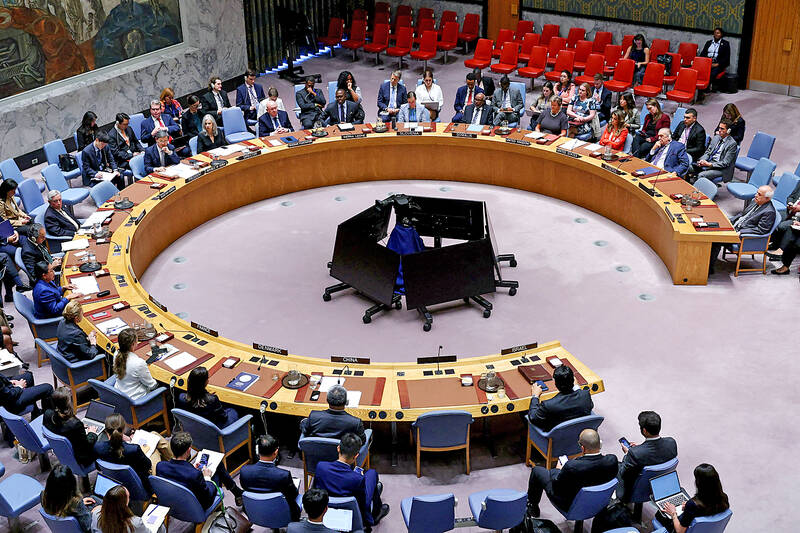The UN Security Council voted yesterday on reimposing deep economic sanctions on Iran over its resurgent nuclear program.
The UK, France and Germany — signatories to a 2015 deal known as the Joint Comprehensive Plan of Action (JCPOA) intended to stop Tehran obtaining nuclear weapons — alleged that Iran has broken its promises under the treaty.
Diplomatic sources said the resolution before the Security Council was unlikely to get the nine votes needed to uphold the “status quo” — in which sanctions remain lifted — meaning the punishment would be reimposed.

Photo: AFP
Iranian Minister of Foreign Affairs Abbas Araghchi yesterday said he had put forward a “fair and balanced” proposal to European powers to prevent the return of sanctions.
However, French President Emmanuel Macron said he expected international sanctions to be reinstated by the end of the month.
In a letter to the UN last month, the “European Three” slammed Iran as having breached several of its commitments under the JCPOA, including building up a uranium stock to more than 40 times the level permitted under the deal.
Despite a flurry of diplomatic talks between the European powers and Tehran, the Western trio insisted there was no concrete progress.
Russia and China, which oppose the so-called “snapback” of sanctions, would need to secure nine votes from the 15 members of the Council.
“Algeria and Pakistan may support Russia and China in backing the resolution, but I think other members are likely to oppose it or abstain, so the Europeans and US will not have to use their veto,” International Crisis Group analyst Richard Gowan said.
“The Council still has time to greenlight a further resolution extending the suspension of sanctions — if Iran and the Europeans reach a last-minute bargain,” he added.
Iran has threatened to withdraw from the Nuclear Non-Proliferation Treaty (NPT) if the snapback is triggered.
The meeting was still ongoing as of press time last night.

Taiwan is projected to lose a working-age population of about 6.67 million people in two waves of retirement in the coming years, as the nation confronts accelerating demographic decline and a shortage of younger workers to take their place, the Ministry of the Interior said. Taiwan experienced its largest baby boom between 1958 and 1966, when the population grew by 3.78 million, followed by a second surge of 2.89 million between 1976 and 1982, ministry data showed. In 2023, the first of those baby boom generations — those born in the late 1950s and early 1960s — began to enter retirement, triggering

One of two tropical depressions that formed off Taiwan yesterday morning could turn into a moderate typhoon by the weekend, the Central Weather Administration (CWA) said yesterday. Tropical Depression No. 21 formed at 8am about 1,850km off the southeast coast, CWA forecaster Lee Meng-hsuan (李孟軒) said. The weather system is expected to move northwest as it builds momentum, possibly intensifying this weekend into a typhoon, which would be called Mitag, Lee said. The radius of the storm is expected to reach almost 200km, she said. It is forecast to approach the southeast of Taiwan on Monday next week and pass through the Bashi Channel

NO CHANGE: The TRA makes clear that the US does not consider the status of Taiwan to have been determined by WWII-era documents, a former AIT deputy director said The American Institute in Taiwan’s (AIT) comments that World War-II era documents do not determine Taiwan’s political status accurately conveyed the US’ stance, the US Department of State said. An AIT spokesperson on Saturday said that a Chinese official mischaracterized World War II-era documents as stating that Taiwan was ceded to the China. The remarks from the US’ de facto embassy in Taiwan drew criticism from the Ma Ying-jeou Foundation, whose director said the comments put Taiwan in danger. The Chinese-language United Daily News yesterday reported that a US State Department spokesperson confirmed the AIT’s position. They added that the US would continue to

The number of Chinese spouses applying for dependent residency as well as long-term residency in Taiwan has decreased, the Mainland Affairs Council said yesterday, adding that the reduction of Chinese spouses staying or living in Taiwan is only one facet reflecting the general decrease in the number of people willing to get married in Taiwan. The number of Chinese spouses applying for dependent residency last year was 7,123, down by 2,931, or 29.15 percent, from the previous year. The same census showed that the number of Chinese spouses applying for long-term residency and receiving approval last year stood at 2,973, down 1,520,